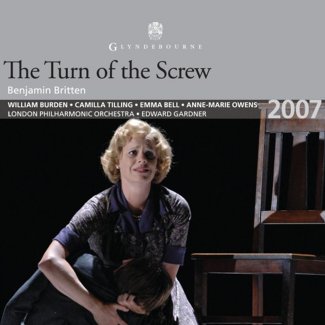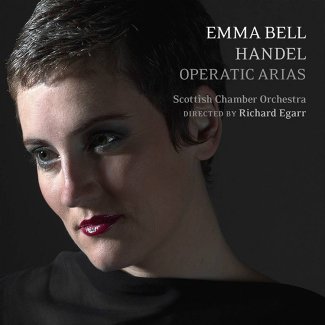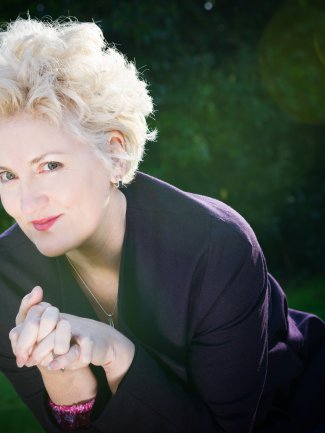
Emma Bell
Download Assets
“Festival-favourite Emma Bell was superb as Elisabeth, capturing both the divine and vulnerable aspects of her character. Her voice soared effortlessly above the orchestra with a celestial intensity.”
The Guardian, August 2023
Emma Bell’s career is marked by a compelling evolution, from the elegance of Handel and Mozart’s heroines to the psychological depth of Wagnerian drama and the bold expressiveness of contemporary repertoire. Her portrayal of Elisabeth (Tannhäuser) at the 2023 Edinburgh International Festival under Sir Donald Runnicles was hailed by The Scotsman as “sensational… a powerful, highly emotional and moving performance.” She has further performed Venus and Elisabeth (Tannhäuser) at Deutsche Oper Berlin under Sebastian Weigle, Elsa (Lohengrin) at Staatsoper Hamburg under Simone Young, and Eva (Die Meistersinger von Nürnberg) at Bayerische Staatsoper under Kirill Petrenko and at the Royal Ballet & Opera, Covent Garden with Sir Antonio Pappano.
This season sees Emma Bell make a further major Wagnerian debut as Senta (Der fliegende Höllander) for Welsh National Opera under their music director, Tomáš Hanus. At the same time, she extends her armoury of roles by Benjamin Britten when she sings Lady Billows (Albert Herring) for English National Opera and Mrs Grose (Turn of the Screw) in continuation of Deborah Warner’s cycle at Opera di Roma under Henrik Nánási.
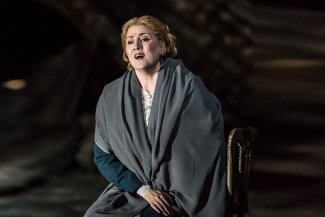
See more
Emma Bell’s operatic versatility continues to shine in roles such as Leonore (Fidelio) at Opernhaus Zürich under Markus Poschner, as Madame Lidoine (Dialogues des Carmélites) at Covent Garden under Sir Simon Rattle, as Ellen Orford (Peter Grimes) at Teatro la Fenice conducted by Juraj Valčuha, and Vanessa at the Glyndebourne Festival in Keith Warner’s production under Jakub Hrůša. Her affinity for dramatic storytelling extends beyond the opera stage to the concert platform where acclaimed recent performances include Elizabeth I in Brett Dean’s In spe contra spem with Orquesta y Coro Nacionales de España under Jaime Martín, and Mahler’s Symphony No.8 with the London Philharmonic Orchestra under Edward Gardner.
She has toured Britten’s War Requiem with Orchestre de Paris and Daniel Harding, and performed core repertoire such as Beethoven’s Symphony No.9, Strauss’ Vier letzte Lieder, and Wagner’s Wesendonck Lieder with leading orchestras including the Gothenburg Symphony, Helsinki Philharmonic, and BBC Philharmonic under conductors such as Kent Nagano, Vladimir Jurowski, Gianandrea Noseda, and Sir Antonio Pappano.
A graduate of the Royal Academy of Music and winner of the prestigious Kathleen Ferrier Award, Emma Bell came to prominence through her interpretations of Mozart’s prima donnas — singing both Contessa Almaviva (Le nozze di Figaro) and Donna Elvira (Don Giovanni) at the Metropolitan Opera, and Elettra (Idomeneo) and Stravinsky’s AnneTrulove (The Rake’s Progress) at Teatro alla Scala, showcasing a crystalline tone and dramatic sensitivity that quickly established her as one of Britain’s finest sopranos.
Contacts
Shirley Thomson Senior Director, VOICE at HarrisonParrott | Head of CSR
General Management
Gallery
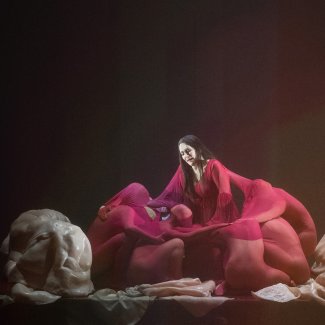
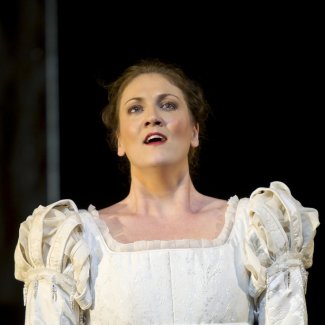

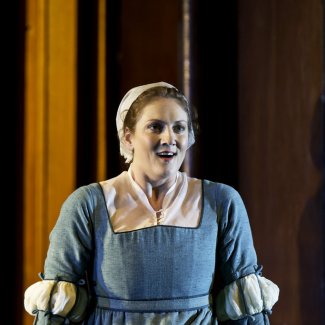




“Emma Bell whoops deliciously in her outrageous coloratura outbursts, playing Lady Billows in Land Army khaki.”
“Emma Bell imbues every note she sings with character to give a priceless turn as the ‘She Who Must Be Obeyed’ Lady Billows.”
“A luxurious governess [Mrs Grose] is Emma Bell, here a woman mature in age and resolute in wisdom. Her gestures, technique, and timbre dictated by the rules of good social etiquette in Puritan England, with postures worthy of a reliable English nurse and leaps in range (in which she excels) and mood that underscore her ironic and nervous temperament, partly as compressed as the secrets she perhaps already unconsciously knows.”
“Emma Bell is excellent as Mrs. Grose, gifted with a resonant and powerful vocal instrument with which she successfully portrays a character who is initially reassuring and gradually drawn by the governess into the vortex of her visions and ghosts.”
“the placid and rounded voice of Emma Bell, perfectly sculpting with a bewitching voice the role of Mrs Grose”
“Emma Bell’s Mrs Grose displays a full and vigorous voice, especially in her middle range; furthermore, her phrasing, which colours the character as a world-weary governess, is exemplary.”
“She was matched by Emma Bell, never better, as the sympathetic Gretchen pleading for Christ’s soul.”
Emma Bell’s powerful soprano voice effortlessly rose above the entire orchestra and choir voices like an archangel’s proclamation.
“Emma Bell, whose voice has become darker, portrays Elizabeth … her powerful spinto reflecting the relative power of the two monarchs during Mary’s captivity.”
“Emma Bell’s powerful soprano voice rose effortlessly above the entire orchestra and choir voices like an archangel’s proclamation.”
“Boasting the necessary vocal amplitude, Emma Bell’s Duchess [Foreign Princess] never overdoes her character’s nastiness.”
“Particulary persuasive were … Emma Bell’s passionate Sieglinde, which quite properly saved the best until last”
“and Sieglinde sings “O hehrstes Wunder! Herrlichste Maid! …” with enormous power and feeling. This is Wagner’s lyricism at one of its highest points, beautifully expressed by Emma Bell, who was outstanding in the role.”
“Emma Bell’s vividly projected, drivingly powerful Sieglinde. She is new to this cycle and for sheer power provides the evening’s most overwhelming climax in her Act III outburst “O hehrstes Wunder”.”
“the love (and lust) between him and his twin sister, Emma Bell’s
impressive Sieglinde, feels real.”
“and Sieglinde, Emma Bell, fearless in vocal strength”
“Elisabeth found Emma Bell at her vibrant, full-blooded best, raising the rafters with an impersonation that was intensely human and refreshingly un-saintly.”
“Elisabeth found Emma Bell at her vibrant, full-blooded best, raising the rafters with an impersonation that was intensely human and refreshingly un-saintly.”
“Bell was sensational as the devout self-sacrificing “angel”, giving a powerful, highly emotional and moving performance.”
“Emma Bell brought erotic flair to her beautiful singing as Venus.”
“the arrival of the British soprano Emma Bell as Elisabeth reminded us that for a major European opera company only the best will do: here was a voice that opened from a murmur to a full fortissimo with hardly a ruffle, floating with apparent ease on the highest registers.”
“As Elizabeth, weighing up whether or not to sign Mary’s death warrant, Emma Bell revelled in spat-out consonants and powerful vocal declamation.”
“Bell’s richly upholstered tone, capable of encompassing regal, menacing and self-doubting modes alike.”
“Emma Bell is a vocal force as Venus.”
“the seductive Foreign Princess who tempts the Prince becomes a fashionable Duchess, superbly sung by Emma Bell.”
“But the night belonged to Bell with her majestic performance of ‘Abscheulicher! Wo eilst du hin?’ and ‘Komm, Hoffnung, lass den letzten Stern’. The audience’s enthusiastic applause was well-deserved.”
“…it’s an undeniably exciting [voice], climaxing in an Abscheulicher! aria that moved from controlled rage into radiant hope”
“Ellen Orford was essayed by soprano Emma Bell, drawing out the nuances and complexities of her relationship with Grimes … expressively she captured her growing anxiety, anger and fears with her intelligently crafted and perfectly controlled lines, rich in detail and emotional strength.”
“Emma Bell is terrifying as Aunt Lydia, delivering music of extreme virtuosity that perfectly depicts the overzealous certainty of this true believer of the Gilead doctrines.”
“Emma Bell is terrifying as Aunt Lydia, delivering music of extreme virtuosity that perfectly depicts the overzealous certainty of this true believer of the Gilead doctrines.”
“The Aunts are led by Emma Bell’s ferocious Aunt Lydia, whose stratospheric coloratura vocal line is as taut as a steel wire but who, when joining in the singing of hymns, ironically proves capable of sweet sincerity. Bell whips up a terrifying tension, viciously relishing her control”
“…a cast that is wholly magnificent, with Emma Bell issuing terrifying power as Aunt Lydia, the handmaids’ controller, in coloratura vocal writing that is ferociously convoluted and unnatural – perfect to convey the perverted logic of her directives.”
“Emma Bell acts with the requisite narcissistic passion and sings with security and point”
“the cast is excellent. Emma Bell’s Vanessa captures the pent-up frustration of the character, her soprano ringing free.”
“Finally, the soprano Emma Bell captures without fail the many strong passages of the score, with dark toned voice but crystal clarity, all served by an irreproachable projection and oh how necessary in this work.”
“her Matilde radiated exciting, fearless, house-filling vocalism … Bell hit her notes with an intensity and purity that really made you believe.”
“Emma Bell , quintessentially the ideal kind of full, dark Wagner soprano, responded with queenly poise and command, her clearly dictioned words winging their way across orchestra and auditorium. If Renes provided the paragraphing of the music, she it was who touched the poet’s phrasing – spinning spells of unendlich anhaltende Liebe, eloquently paced and peaked. Twenty-three distinguished minutes.”
“Warner also drew brilliantly and beautifully acted performances from the entire cast…Pent up with waiting, Emma Bell’s Vanessa soared with lustrous top notes, and she found that tone of knowing self-deception – understanding more of the situation than she allows herself to admit.”
“Musical values represent the company at the very top of its game, with soprano Emma Bell alternately portraying a seer-like figure and a universal mother, her empowered vocalism setting the seal on the central trio of principals.”
“A love triangle with a difference, the story was brought brilliantly to life on the Glyndebourne state, the warmth and clarity of soprano Emma Bell’s Vanessa a standout triumph. This is a voice that cries out for Janacek”
“Emma Bell is a painfully fragile Vanessa who veers between elated rapture, soaring gleamingly at the peaks, and agitated restlessness. Like Tennessee Williams’ Blanche DuBois, Vanessa is feverish from the first and Bell uses the florid ornamentation and chromatic disruption of the vocal line to convey her impetuousness and her anguish.”
“Bell gives one of her finest performances to date, beautifully acted, her voice soaring with elation and anguish, even as Vanessa becomes increasingly deluded as to Anatol’s true nature.”
“Emma Bell gets some big singing as Vanessa, in which she is impressively fearless, and creates a highly charged character, coming alive with all the pent-up emotions of the previous 20 years.”
“English soprano Emma Bell’s Governess sings ravishingly, beautifully molding and coloring every phrase, but also vividly portraying her battle with demons, whether internal or external.”
“The response of Emma Bell’s Ludmila was genuinely luminous; her tone was pristine, heroic and swelled with the exultation of one who has genuinely seen the light.”
“Sung with poise and sincerity by Emma Bell, Ludmila emerges as a Victorian heroine.”
“That woman, Elisabeth, is played by Emma Bell and the British soprano rockets herself into the Wagnerian premiere league with this performance. Her timbre has always been unique – imagine Kathleen Ferrier up an octave – but now Bell shows so much more: perfect intonation, tenderness, subtle variation, compelling acting.”
“Emma Bell looked wonderful, acted sensitively and was at her impassioned best in the latter half of Act 2. The audience acclaimed her with special warmth.”
“Emma Bell’s Elisabeth emerged as a fully convincing stage presence (somehow both formidable and vulnerable as the bride-in-waiting)…her quiet singing in Act 3 was particularly enchanting.”
“Emma Bell makes a rich-toned, nobly assertive Elisabeth.”
“Emma Bell was the ideal Elisabeth…Beautiful to look at, a radiant stage presence, passionate and poignant, she was by far the star of the show. She made one of the most exciting entrances I have seen, and her defence of her wayward lover had all the required power and intensity. This was one of the great Wagnerian assumptions at the Royal Opera in recent years.”
“Emma Bell’s Elisabeth is commandingly expressive.”
“Emma Bell is not only warm and secure in tone as Elisabeth, but tingling with sensuality.”
“a sizeable voice and sang the demanding role fearlessly.”
“The role’s fierce musical glories (superbly rendered by the soprano Emma Bell”
“It is almost invidious to single out individual performances in what was an impressive collective achievement, but Emma Bell deserves pride of place for her overwhelming performance as the Governess, an assumption that by vocal and dramatic means brought the character to frightening life.”

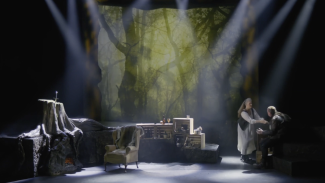












![Barber: Vanessa [Emma Bell; Virgine Verrez; Edgaras Montividas; Rosalind Plowright; London Philharmonic Orchestra; The Glyndebourne Chorus]](/sites/default/files/styles/square_small/public/images/albums/2021-05/71Df7RMxLlL._AC_SL1200_.jpg?h=765291da&itok=FtcmV0Yd)
